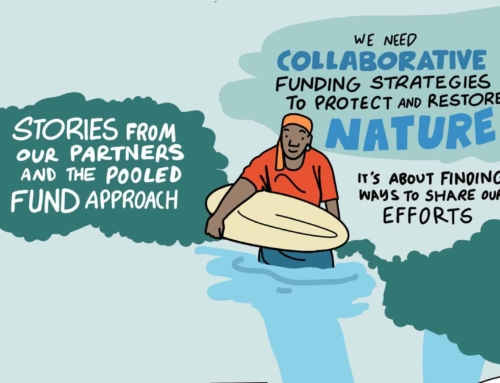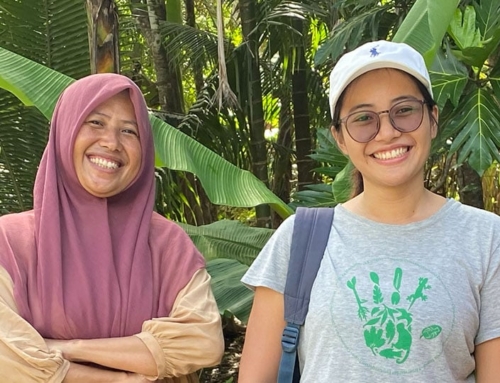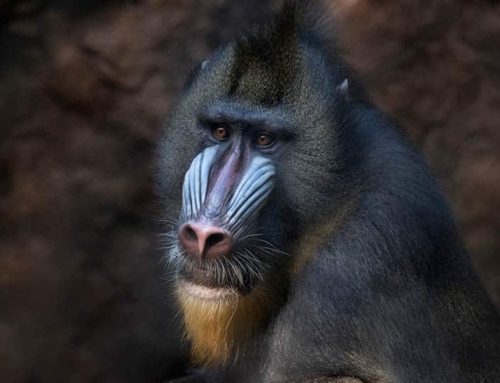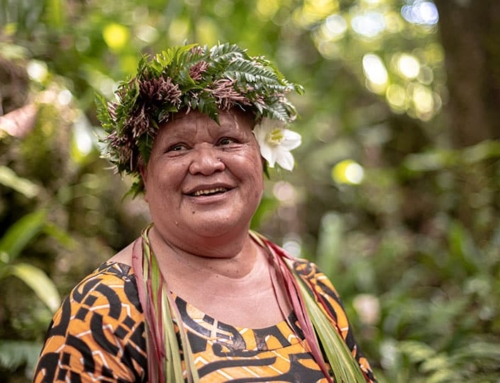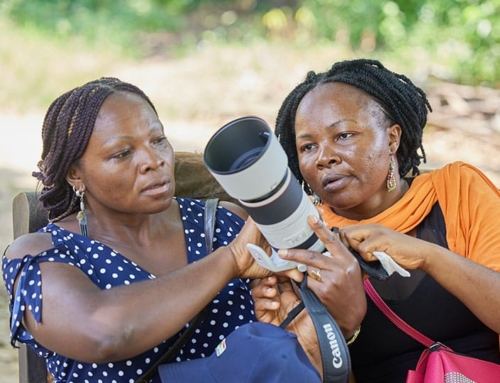Dr Jerome Lewis is a Reader in Social Anthropology at University College London. He has undergraduate and doctoral degrees in Social Anthropology from the London School of Economics and 25 years of research experience working with Pygmy hunter-gatherers and former hunter-gatherers in the Congo Basin.
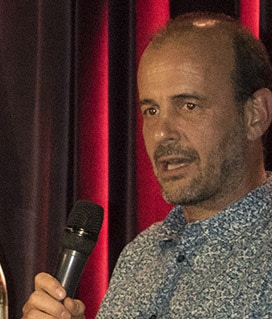
He is Co-Director of the Extreme Citizen Science (ExCiteS) Research group at University College London (UCL) which develops tools and methods to enable anybody, regardless of education or background, to collect information to support environmental justice. He is also a director of the Centre for the Anthropology of Sustainability (CAoS) at UCL. We spoke to Jerome to find out more about his work with hunter-gatherer societies, get his views on the challenges for conservation in the Congo Basin and understand more about the role of citizen science in conservation.
Hunter-gatherer societies
Q: Where does your interest in hunter-gatherer societies come from?
I’m particularly interested in hunter-gatherer societies because of their egalitarianism. These are societies in which people are very autonomous, there is no gender inequality, no ageism. I find this egalitarianism fascinating: how to live without hierarchy, without people bossing you around, how to experience the world as an equal to everyone around you.
I have a deep interest in politics, religion and language. Understanding how these groups organise themselves and are structured has been an enduring fascination for me. In terms of religion, for example, what hunter-gatherer societies demonstrate is a religious system that has no dogma and no liturgy. It is entirely based on music, song and dance, and from an anthropological perspective that gets right to the heart of what religious experience is about.
My main academic work is on the evolution of language and of music, but that broadens out into questions of how human societies endure within a landscape, a question which has a bearing on ideas about sustainability:
What does it mean to be so aligned with the landscape you depend upon that you can live there for thousands of years?
Hunter-gatherers are currently facing a range of external pressures and challenges, most of which stem from our world, so I have also been investigating questions around forest certification, conservation, indigenous rights and human rights, particularly in the Congo Basin, where there has been a lot of conflict.
Q: The idea of a culture and people that are aligned with their landscape raises questions around the extent to which people shape and are shaped by their environment. How would you describe the connections between people and biodiversity in some of the areas in which you have worked?
The first thing to say is that cultural diversity and biological diversity are not coincidental by chance. They are coincidental because they feed one another.
For instance, in the places where I work you have hunter-gatherers who roam very large areas hunting and gathering and there are farmers who cultivate much smaller areas. These two groups share the landscape sustainably, because they have very different modes of exploiting it: the actions of the farmers drive one particular environmental trend, the creation of secondary forest plots which make very good habitat for many smaller animals and for young trees to grow. Meanwhile, the hunter-gatherers, who roam over much larger areas and try to select male animals as much as possible when they are hunting, are engaging in another type of thinning, which allows the females and the young of those species to enjoy the extra resources that are freed up as a result. Different forms of economic engagement with the environment result in different impacts on that environment.
There are all sorts of ways that people also modify their environment. For example, there’s a beautiful and huge tree in central Africa called the Moabi tree that produces nuts containing very rich oil with all sorts of excellent properties. The nuts of this tree are so desirable to wild boar and elephants that they finish up all the seeds they can find on the ground, so Moabi trees have great difficulty reproducing. But when women collect the seeds to process the oil – for eating and beauty – they tend to accidentally drop a few here and there, and that is where new Moabi trees grow. So, in the national parks in the region, (from which hunter-gatherers have been evicted), it’s almost impossible to find young Moabi trees. A Moabi tree in a national park is very likely to be an archaeological site of ancient human inhabitation.
‘Paracultivation’ is another way that people modify their environment. When hunter-gatherers collect wild yams, they take out the stem – the vine on which the leaves grow – since it’s the root that forms the yam they seek. Rather than just leave the stem on the floor, they plant it back in the earth so it rejuvenates and grows new wild yams. Over many thousands of years of people collecting them and putting back the stems, wild yams have been able to flourish in the forest, benefitting both the people and the other animals that eat them. Wild yams are a vital food source for many wild species. All landscapes are the product of such interactions.
Q: What have you learnt from spending long periods of time with hunter-gatherers?
I think the fundamental thing that living with such people teaches you is that differences should not be judged as better or worse. Things are different, people are different and that is fine. It’s not something to start classifying as good or bad. In different circumstances things that seemed bad become good, and vice versa. Living with such people reinforces the importance of the equality of all: this fly or that antelope has as much right to be in that space as you the human being, or the gorilla.
It reinforces a profound sense of equality – we are all in this game of life together and we need each other to live well.
They organise their economic life by a very simple principle: sharing. Anything you take out of the forest you must share on demand. You have no right to refuse anybody. You have to share what you have if somebody else asks for it. As long as you share everything you take out properly among all present, you will always experience abundance. I think that’s a very profound insight into the quandary that we face in our society, which is based around inequalities that encourage hoarding, which is, of course, wastage. If we can internalise that this is the path to abundance then we’ll be very close to resolving many of the problems we’re facing at the moment.
Conservation: challenges and what good conservation looks like
Q: In your experience, are there times when the approach of some of the larger conservation NGOs is at odds with the lives of hunter-gatherers?
I think the biggest issue is an ideological one: the dominance of an idea of natural wilderness that governs how conservation is conceived.
As I was just explaining, people are integral to how their environments are shaped and the diversity that these environments support. Yet conservation organisations insist on forcibly excluding them.
This alters the environment and establishes an unsustainable situation. Such colonial-style occupation of forests depends on violence and repression and this alienates local people. If you alienate the population – the real, long-term residents of this space – then you’ve lost your best allies for potentially conserving it.
Much conservation is based on this exclusionary, colonial way of managing wild spaces, which, as far as I have seen in central Africa, is almost always ineffective. I don’t know a single national park that has genuinely succeeded in its objectives, and there remain numerous intractable problems (not always to do with conservationists). Fundamentally, this alienation of local people and the failure to be equally tough on loggers, miners and plantation businesses, is at the heart of the problems facing conservation and is widespread right across central Africa.
Q: From your years of experience working in the Congo, what have you found to be the biggest obstacle to effective conservation?
Corruption. Political challenges are the biggest challenge to conservation by far. Unless conservationists are willing to address that challenge head on, I think we’ll never achieve what conservationists would recognise as success. The international emphasis on extractive industries in these regions has promoted some very corrupt political systems. Many local elites follow this model, and consider it their right to pillage whatever resources they can get in the areas for which they have responsibility. As a result, there is massively damaging, organised commercial or industrial exploitation of resources in these areas, and because it’s organised by local elites, conservationists rarely oppose it, or succeed in doing much about it.
Q: And I guess there is also then the risk of some of the indigenous inhabitants living in the forest being drawn into that corrupt and exploitative system?
Many are denied access to their ancestral forest and livelihoods, so individuals can become vulnerable to coercion and can be tempted by promises of wealth, which creates a vicious cycle of increasing persecution and resource poverty.
In 25 years of watching the Ndoki forest in northern Congo I have watched a rich forest teeming with elephants, gorilla and many other animals become an impoverished woodland criss-crossed with roads and outsiders commercially exploiting its resources.
This has proved to be disastrous for it. At the national and international level, the conservation of a small area of forest is used to legitimate industrial exploitation of the rest of it: those extracting, transforming and degrading the forest justify their actions by pointing to the conservation area somewhere else. Sometimes big organisations like the World Bank make direct reference to this, saying that they have supported a conservation area so it is fine for them to lend more money to a mining company to expand its extremely damaging activities. On the other side, conservationists say they have to be tough on local people because there is so much destruction going on everywhere, but fail to be equally tough on industry. On the contrary, they are far more likely to partner with industrial companies than local communities, and this understandably alienates local people. As a result, conservation loses its best potential allies for really effective conservation.
Q: How can conservation be more effective in this type of situation?
I think conservation must switch from top-down approaches to ones working from the ground up. It is through working with local people, those who have the most knowledge and interest in these areas: they live in them, their children will inherit them. Instead of investing most of their budgets to create military units to harass (control) local people’s resource use, conservationists should be working to find very clear ways for local people to engage in conservation. A lot of my work, particularly in the ExCiteS research group supporting ordinary people to document and collect evidence about what is happening in their local environment, is trying to do just that.
Q: Can you give an example of locally-led conservation you have seen that has been particularly effective?
Sadly, not in Central Africa, but I have seen very successful conservation efforts in other places. For example, I recently visited an indigenous territory in the Brazilian Amazon called Apwitxa to which the local people, the Ashaninka, have obtained formal land title.
When they first got the title, the land was so badly damaged that it wasn’t even good for cattle pasture. Yet in 30 years they have transformed this space into one of the most beautifully diverse forests I have ever seen.
Through a very careful process they have been planting – or replanting – indigenous species, but also enhancing the food production of the forest by introducing certain fruit and nut trees that are particularly prolific food producers for people and for animals. The thinking that has gone into nurturing this beautiful space is based on the desire to achieve harmonious relations with the diversity of plants and other species that interact to make their forest healthy, and so support their livelihoods and those of their children after them. They are a very autonomous people, so each house is 50-100m from the other houses, but they also have a profound sense of natural aesthetics, so they lined the pathways between houses with a type of palm that has a white, slightly luminous skin, so that in moonlight you can clearly see where to go. There was a kind of progressive sense of the space breathing its vitality into the human community, and the human community breathing their vitality into that space, which was absolutely beautiful.
They now have nurseries for many of the indigenous plants that they give to their neighbours, who have now started planting them too. They invite outsiders – neighbouring rubber tappers and other indigenous groups – to visit them to learn about how they’ve organised themselves to support their territory since they reason that unless their neighbours do the same, their forest will remain vulnerable. It really is remarkable what they’ve achieved.
Q: And this is all done without intervention from any Western NGOs, completely from the ground up?
Yes, the Ashaninka have their own very clear approach. After generations of being victims of history they have taken charge of their future. They have applied for and benefitted from grants from various funds for some of their projects, but the vision is absolutely theirs. For instance, they asked the Centre for the Anthropology of Sustainability to collaborate with them to fund exchange visits to the Guarani indigenous people whose Atlantic forest is now reduced to 8% of its former size and who are losing land to agribusiness expansions. The exchanges have included seeds, skills, knowledge and networks to secure land rights, and they have been a great success.
For me, what is most exciting about the Ashaninka’s approach is that it demonstrates how you can escape the constraints of your history to imagine and then realise the future you seek. To address climate change here in the west, we urgently need to begin such processes.
Their shamans lead regular rituals with the whole community where they commune with and sing to the spirits of the river, forest, birds or higher beings. They have visions in these ceremonies that guide them to imagine the future. Once one of them has such a vision, they share it with everyone. With such an abundant forest they can then sit down to hold a meeting to talk over the vision – for several days of even a week if necessary – and decide on what they can do and the best practices they need to employ in order to make that vision real. Their achievements are quite astounding.
Q: So they have managed to do that despite the numerous threats they face – the gold-diggers, poachers – and all the other forces they might be up against?
I think they have done it because of those pressures and threats, because they really want to have a liveable space for their children to thrive in, and that liveable space is one that they know from the past. They’ve decided that they want to recreate that space, but in a very sensitive way. For instance, they asked us to get involved with them because they were having trouble with poachers overfishing in their river. They wanted to find a way to map exactly where on their land these incursions were occurring so that they could put pressure on the local police to take action. As it happens, it wasn’t very successful, partly because the local police didn’t take action, but also because the process of mapping was too long, they needed it to be more immediate.
So they formed a group of young men from the community. When incursions take place, the Ashaninka pay them a visit, armed with their bows and ordinary arrows, and they film them. They tell them that they’re filming them, that they’ve seen what they are doing and that the land belongs to them. They warn the ‘invaders’ that if they don’t leave their land, they will be back the next day with their bows and poison arrows. They’ve found that this works very effectively to get people off their land! So they’ve found their own solutions in their own context, but we try to support them in whatever ways we can with knowledge we have – including a PhD student, Carolina Comandulli – a member of the Extreme Citizen Science research group, who has been living with them for the past three years to document their approach.
Citizen Science – conservation for all
Q: Could you give us a brief overview of the citizen science applications you are developing with ExCiteS (the Extreme Citizen Science group) at UCL?
This research group began with the realisation that smartphones, which many people carry in their pockets nowadays, have more accurate instruments on them than those that were available to Einstein when he was developing the general theory of relativity. Systematic data collection and analysis are incredibly powerful tools that science has refined: if people learn how to record key data using their smartphones, there is huge potential for all sorts of analyses to be done to guide effective understanding and action.
At ExCiteS we design tools and methods to enable anyone to produce scientifically valid local ecological knowledge that can then interact with other more formal knowledge regimes to promote better understanding and knowledge, often in the context of environmental justice issues. A big problem currently facing the world is that we don’t understand the environment properly, or in sufficient detail, and people who spend time learning about it soon find out that the more you learn, the more you realise you don’t know!
All analysis is based on comparison: by comparing two different things or the same thing at different times, you can start to analyse how something has changed and then hypothesise about why. It’s something that human brains just do. So we designed an app called ‘Sapelli’ for android smartphones, along with map visualisation software, so that anyone regardless of literacy or language can collect data documenting important local phenomena like illegal hunting or logging, animal sightings, or air pollution, and create maps that facilitate analysing what they’ve recorded.
This enables participating citizen scientists to reflect upon what’s happening – you might see a decrease in numbers of certain species, you might see encroachment by outsiders, whatever those patterns are, people can then reflect for themselves on what they wish to do about it.
For us, that’s the crucial thing: empowering local people who are there in the midst of those issues to take informed decisions. Maybe they take good decisions, maybe they take bad decisions, but whatever decisions they take, they are the ones who learn the lessons from them.
Currently there is a dominance of professional managers, populating top-down institutions for managing the vital landscapes on which our planetary health depends. These mostly faceless individuals make very important decisions that then have huge consequences for local people. Managers generally go off to another position at another organisation or location after 3, 4 or 5 years, occasionally longer, so that the learning and awareness of the mistakes they have made is lost and local people just have to somehow carry on in the context of whatever mess was left. ExCiteS seeks to keep that learning in the hands of local people who remain in the area.
Q: What are some of the benefits of using this type of technology?
We did a project with a group in the Central African Republic because a logging company had just been given rights to log their area, so they wanted to document their key resources to prevent them being damaged by the loggers – something we have done in many areas. We facilitated that – it’s all done with iconic software, based on symbols so that anyone can use it. This was successful, they mapped their key resources without us being involved, and we saw some of the maps they created. But other benefits also emerged from this process. Local participants were a youth organisation composed of farmers and hunter-gatherers. The process of working together to map their environment galvanised them into realising that they could achieve more together as a group to address other problems they identified. From our point of view it’s not about which type of technology you use, it’s more about a mind-set: collecting evidence to document what is happening, and collectively reflecting upon it to understand how to address the issues as a result. It transforms participants from reacting to changes to proactively shaping processes so that outcomes reflect their values and provide the results they seek. It’s that process of problem solving and empowerment that we really encourage.
Q: What potential do you see for citizen science as a way to improve conservation outcomes, both in terms of people’s lives and for the ecological health of the planet?
Well, I think it’s one of the few truly global solutions that we have available to us for conservation. When people start to document what’s going on around them in their natural environment, that awareness often brings care and concern.
If you’re not really sure how or why something is happening, its more difficult to decide what to do about it, you are less likely to be concerned or to think about what you might be able to do about it.
In the context of pollution, for example, or species loss, when people start to become more aware that it is happening around them in their local area, they do generally get quite concerned about it and want to address it. The basic premise of our activities is that when people understand something, they will act upon it – not everybody, of course – but there will always be some who do and that’s enough to make a difference, a huge difference, in fact.
We, along with global citizen science associations, have an ambitious, but realistic target: by 2020 we want to get 1 billion citizen scientists active across the world. If we can engage more of the world’s population in citizen science activities, I think we really can change the trend of apathy and fatalism that is currently so prevalent, and is pushing us to the brink of ecological meltdown.
Q: And these tools are potentially equally powerful wherever you live?
Yes, they can be used wherever you are – we work as much with communities in Europe or London, for example, as we do with others in more remote and challenging locations. We always ask the community to determine what the problem is. In London, we’ve done projects relating to noise pollution on the flight path to Heathrow airport based on earlier ones we did around City Airport. Pollution in the street is currently a big issue, so we’ve supported communities to set up pollution monitoring kits to see what’s going on in their local high streets and town centres. They have been using these kits in Brixton, in Putney and several other areas of London. Using the maps to display the data collected has put pressure on various local authorities to start to take action as a result of the evidence provided by citizens. Now the Mayor of London has made tackling air pollution one of the priorities of his time in office.
Citizen science is incredibly powerful, and it’s available to all of us if we just apply our minds to what matters around us.
Nurturing more effective collaboration
Q: One of the great challenges for conservation seems to be developing ways to collaborate – across disciplines and organisations – in really meaningful ways. Why do you think genuine collaboration seems to be so difficult?
Collaboration is, frankly, the only way forward. We need to break down this barrier between nature and humanity. If we can break that barrier then the directions the collaborations need to go in become much clearer – not just between people, but also between people and other species. All environments are nested within larger ecosystems – my gut bacteria are crucial to my health and well-being, yet nested in my stomach. My body is nested in a bio-cultural space – London, which is itself nested in Britain, and eventually the Earth System. What I eat affects my gut bacteria, but also the environment external to my body. So my dietary decisions have an impact on their health, and hence my own health too. It is like this for every organism at every level of existence on earth. So the collaborations of the future need to be multi-scalar, from the non-human to the human level. Between humans collaborations between experts are important, but just as important we also need to go all the way down to the base, to ordinary people on the ground, and work out meaningful collaborations with them.
That requires time, and one of the problems for conservation is the time pressure of funding cycles. Most conservation organisations are obliged to work on three-year cycles and they’re dealing with problems that have taken decades to develop, and may take decades or centuries to resolve.
Forcing conservationists to prove that they’ve been successful in a 3-year cycle is a disservice to everybody because it encourages a focus on actions that give immediate impacts rather than focussing on being effective over the long-term, and in its worst effects, deception to make things look good.
Conservation takes time; it takes a lot of human and more-than-human relationship building. In the human case trust building really matters – especially when it’s between people with different levels of power or status. Short funding cycles also lead to people disguising failure because they don’t want to lose out in the next the funding cycle, rather than share their learning with others to avoid repeating the same mistakes.
Q: What role could an organisation like Synchronicity Earth play in addressing some of these challenges?
What I think is particularly impressive about Synchronicity Earth’s approach is that, rather than stepping in and claiming to be the experts, you identify and support existing experts that have shown that they are doing important work on the ground. Instead of trying to compete with them by establishing another NGO doing the same work better, Synchronicity Earth identifies, then encourages and supports work that is already being done well. I think that is a really powerful model, and I wish more organisations would adopt that instead of trying to make themselves into the next big thing that’s going to solve these complex problems.
It’s a more backseat approach, in the sense that you’re not necessarily on the ground doing things. But identifying and supporting those people that are making a powerful impact and achieving positive results is vital because often they may be very small organisations, to whom just a small amount of funding can push their work to the next level. It’s an approach that encourages diversity, and that for me is at the heart of how conservation will rise to the great challenges we face.
It’s about diversity at every level – biological diversity, cultural diversity and crucially it’s about a diversity of solutions and approaches, and even a diversity of failures.
Being aware of all those things is vital, so I think Synchronicity Earth’s approach is a really positive way to encourage the diversity that is needed for us to have a chance of ensuring a future liveable planet. Unless we can get diversity to flourish then we really are at a dead end.
There is no simple or single solution, that’s why we need a diversity of solutions. This can only be achieved by a diversity of experiments. Unfortunately, dominant western culture tends to favour monocultures – of solutions (like payments for ecosystem services, or natural capital calculations), or of crops (like corn oil to fuel cars, or the twelve crops and five animal species that feed 75% of humanity) and even – through the dominance of western style education – of our children’s minds. We need to practise as many different solutions to living on this planet as possible, in order to see which endure in alignment with the non-humans they co-dwell with. These are the examples we can support and provide space for flourishing. When human societies maintain themselves over many generations it is because they are aligned with the dynamics of multispecies resurgence. A good place to start is in the existing cultural diversity of humanity. That’s one reason why anthropology matters so much!


